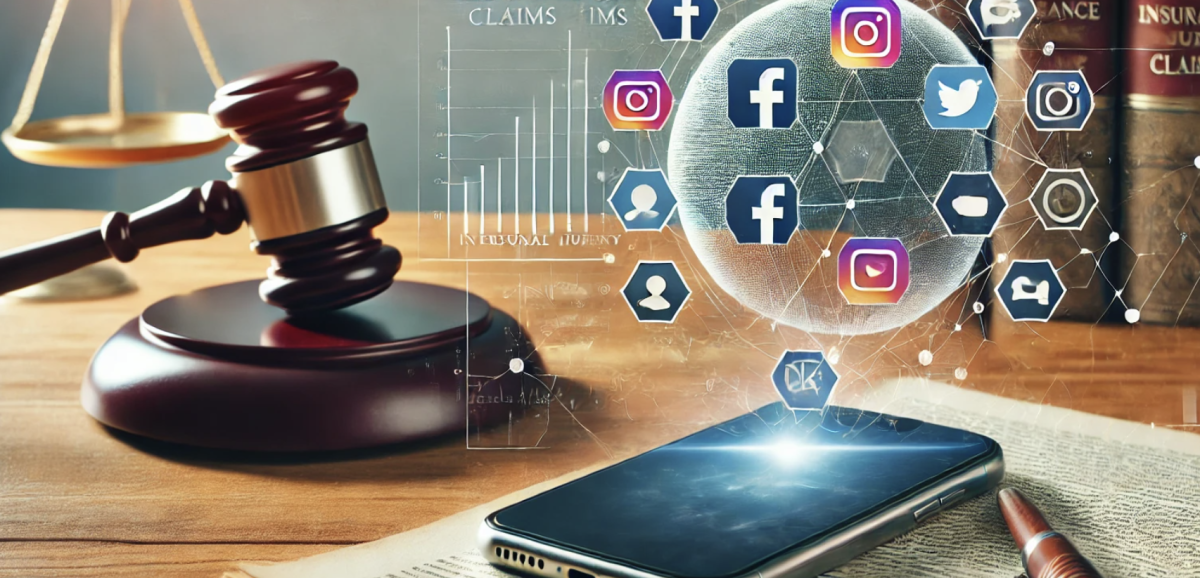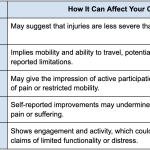Social Media and Personal Injury Claims
Social media and personal injury claims have become increasingly intertwined. Social media provides a digital vault of pictures, posts, comments, and videos (all time-stamped) that can be used as evidence to either support or refute claims related to personal injury.
For example, if someone is claiming compensation for chronic leg pain after an injury, but a posted video shows that individual dancing pain-free - well, legal professionals can put two and two together.
Posts and videos can be taken out of context though, so it is very important to fully understand the profound impacts social media can have on personal injury claims.
Top Lancaster personal injury attorney - RG Injury Law - understands the various subtleties of the modern legal arena. The game has changed with the widespread accessibility to digital evidence. Our clients have the advantage of RG’s commitment to staying ahead of the curve and providing legal guidance that always holds water.
Continue reading to gain valuable insights into the impact of social media on personal injury claims!
Key Takeaways
-
Avoid sharing any updates about your injury or recovery.
-
Refrain from posting pictures showing physical activities or travel.
-
Limit interactions with posts that could contradict your claim.
-
Switch privacy settings to restrict public access to posts.
-
Request friends and family to avoid tagging or mentioning you.
How Social Media Can Impact Your Personal Injury Claim
Social Media as Evidence in Personal Injury Claims
Insurance companies and defense attorneys frequently examine social media profiles for evidence that could undermine personal injury claims.
Even a seemingly harmless photo, a casual status update, or location check-ins can be interpreted as evidence that contradicts the severity of your injuries.
Social Media Content That Can Affect Claims

Common Mistakes on Social Media During a Personal Injury Claim
Types of Posts That Could Harm Your Case
Certain posts can negatively affect a personal injury claim, even if they seem unrelated.
Photos of physical activities, travel updates, or comments about your recovery can be used by insurance adjusters to argue that your injury is less severe than reported.
Posts to Avoid:
-
Photos of you exercising, dancing, or lifting heavy objects.
-
Updates that indicate recent travels or vacations.
-
Comments that downplay pain or show optimism about a quick recovery.
-
Status updates discussing details of your case.
-
Tagged photos at social events.
Impact of Public vs. Private Accounts
Even with strict privacy settings, social media posts can be accessible through court orders.
Insurance adjusters can even request access to private social media accounts. Privacy, in these cases, doesn’t protect from those seeking legal evidence.
Knowing the limitations of privacy settings during a claim can help protect your case.
Tips for Managing Your Account:
-
Switch to private mode but remain cautious about all posts.
-
Limit tagging by friends to avoid unexpected exposure.
-
Disable location tagging to keep activity private.
-
Refrain from discussing your case online.
-
Monitor comments and replies on your profile.
Strategies for Protecting Your Personal Injury Claim
Social Media Do’s and Don’ts for Claimants
Limiting social media activity is one of the safest strategies for protecting a personal injury claim.
Posts, comments, or even reactions to others’ posts can be used against you by insurance adjusters or defense attorneys.
Staying off social media completely is ideal, but if you must stay active, follow these specific guidelines to avoid undermining your case.
Do’s and Don’ts for Social Media During a Claim:
-
Do set your accounts to private, but remember privacy settings aren't foolproof.
-
Don’t post about your accident, injuries, or recovery progress.
-
Do disable location tagging to prevent sharing your whereabouts publicly.
-
Don’t upload photos of physical activities that could be misinterpreted.
-
Do monitor tagged posts carefully and ask friends not to tag or mention you.
Educating Family and Friends on Social Media Risks
A personal injury claim can be impacted by posts made by family and friends, too.
Even well-meaning comments or tagged photos can provide evidence that the defense may use against you.
Making loved ones aware of the risks is essential to protect your claim effectively.
What to Ask Family and Friends to Avoid:
-
Avoid tagging you in any photos, especially of events or activities.
-
Refrain from discussing your accident or injuries online.
-
Limit check-ins or location tags that may imply physical activities.
-
Be mindful of photos they post that could misrepresent your current condition.
-
Respect your privacy by not sharing updates about your situation.
FAQ on Social Media and Personal Injury Claims
Can social media affect my personal injury claim?
Yes, social media can directly impact a personal injury claim. Defense attorneys and insurance companies may scrutinize social media posts, photos, and comments to find evidence that might undermine the severity of your injury.
What are the limitations on personal injury claims?
Limitations vary by jurisdiction and can include statutes of limitations, damage caps, and specific proof requirements. Consulting an attorney can clarify these limits in your specific case.
How much are most personal injury settlements?
Personal injury settlement amounts vary widely. Factors such as injury severity, medical expenses, lost wages, and pain and suffering all influence the final settlement.
Are personal injury claims torts?
Yes, personal injury claims fall under tort law. Tort claims seek compensation for harm caused by another’s negligence or wrongful act, which is the basis for most personal injury cases.
Closing Thoughts: Social Media’s Role in Personal Injury Claims
Today’s interconnected digital world demands more caution and discretion for everyone - especially those involved in legal claims. We leave behind digital footprints whenever we interact with social media. It is unfortunate when a simple post can be used as leverage to challenge an injured person's compensation.
We are all facing these modern challenges together - it’s a good thing devoted experts like the attorneys at RG Injury Law in Lancaster, PA are in our corner. Experienced and trusted personal injury lawyers work diligently to achieve full and just compensation for their clients.
If you need legal guidance or have questions about social media and personal injury claims, RG Injury Law is here for you!




